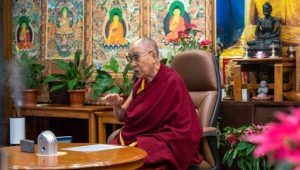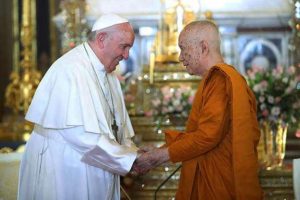On 12 March, at the 63rd session of the United Nations Commission on the Status of Women, I accompanied Venerable Yifa to a panel hosted by Woodenfish Foundation, the non-profit organization she founded in 2002. This was the first modest step in a long-term bid for her organization to function as a platform for Buddhist voices within the UN. It took a good deal of time, effort, and patience for Woodenfish to be granted special consultative status by the UN—something that is still a novelty to 99 per cent of Buddhist groups. This panel was distinctly non-sectarian and focused on charities set up or led by Chinese people in African countries, highlighting how these organizations conduct programs that are collaborative in nature, with a keen grasp of, and sympathy for, cultural sensitivities, and of genuine long-term economic, social, and cultural benefit.
The emphasis on Chinese people doing good was intentional, and the Buddhist connection was not contrived. Ven. Yifa had invited Buddhistdoor Global’s friends from the Amitofo Care Centre (ACC) Hong Kong and ACC’s international branch to talk about the positive impact that the Chinese Buddhist organization has been making in multiple African countries as a counterpoint to the many negative stereotypes painted about the Chinese presence in Africa. As she sees it, the effort of promoting Chinese Buddhism is not only interconnected but executed transnationally: embracing Chinese people around the world, bringing the world to mainland China, and communicating Chinese Buddhism in multiple languages, including the lingua franca of English. At its heart, both Chinese Buddhism and China itself are more cosmopolitan than they are traditionally given credit for.

On 14 March, Ven. Yifa brought the ACC delegation to the Yale Club, before embarking on a nostalgic campus visit to her alma mater the next day. On both occasions we spoke at length about her work and the nuances of the Chinese Buddhist context. Ven. Yifa was born in Taiwan, and her Woodenfish Foundation arranges conferences, meditation retreats, and training programs in mainland China as well as the US. She was originally a novitiate of Fo Guang Shan in Taiwan before her doctoral studies at Yale under the late Buddhist studies scholar Stanley Weinstein (1929–2017) in the 1990s. She obtained her PhD in 1996.
Today, much of Ven. Yifa’s attention is focused on building relationships with temples in mainland China, spearheaded by the successful Humanistic Buddhist Monastic Life Program (HBMLP) and the secondary Buddhism in China series, which ran from 2009–15, connecting young Western scholars with the major historical centers of Chinese Buddhism. The former brings students from around the world to a Chinese monastic setting to immerse them in a period of daily living, training, and ritual (and in doing so helping to nurture a better understanding of Chinese Buddhist practice), and the latter provided scholarships for emerging specialists to engage in intensive study of major historical locations of Buddhism in China.
Ven. Yifa is positive about the way things have unfolded: “Every temple in China that we’ve approached is enthusiastic about hosting the HBMLP, and the permission from government officials supervising religion is often granted only after many years of hard work and cultivating friendships. Many in these communities are surprised and encouraged by how many people outside of China are learning about Buddhism.” Furthermore, the feedback she has received from participants about the HBMLP invokes powerful words like “transformative,” “tremendously impactful,” and a “life experience.”
“Chinese Buddhism has such a rich history and content—from its inception as an adaptive, translated faith tradition to the Tang dynasty’s eight schools and beyond. The third wave of Buddhist diffusion in this century could well be Chinese Buddhism, but how we do it is an important question,” Ven. Yifa said. There are echoes of Yale again as she makes the case for education. The HBMLP, even with its solid track record, is but a small step in the overall objective; a seed. “Teacher for one day, father for a lifetime (一日为师,终身为父),” she noted, indicating her immense respect and affection for Weinstein and how her formative time at Yale shaped her attitude toward Dharma propagation and management of her foundation. “I think that the right attitude of the new generation of messengers of Dharma should be one of humility, professionalism, and fearlessness in the face of challenges.” Strength of character, persistent attention to detail, focused decision-making, mindfulness, creativity, and familiarity with Chinese and Western culture are qualities crucial for the Buddhist leaders of tomorrow.
I asked her what she thought about the overall situation of Buddhism in China from her vantage point, as someone uniquely equipped to move between Chinese worlds. Like many, she believes that the Cultural Revolution was devastating for Chinese Buddhism. She recalls Tang poet Bai Juyi’s (772–846) landscape poem in response:
Grass on the plain is flourishing,
It withers and grows once a year.
Wildfire cannot burn it all;
When spring wind blows it will again come to life.
离离原上草, Li li yuan shang cao,
一岁一枯荣。 Yi sui yi ku rong.
野火烧不尽, Ye huo shao bu jin,
春风吹又生。 Chun feng chui you sheng.

Ven. Yifa said that people often forget how much China has opened up, even as some expect that it does so on the West’s terms. “Understanding has to go both ways. Reciprocity, mutuality: that has always been the Chinese way of harmony,” she said. “For example, I’ve done as much as I can to adapt to the contemporary, global landscape through the HBMLP. Sometimes during the program, Western-born people do not want to bow before Buddha images and therefore struggle to adopt a devotional mindset. They think it’s worshipping statues, and they don’t want that. I have to use my own means and skill to inform them that this refusal and discomfort is based on an incorrect assumption.” There are both small and larger growing pains as Buddhism in China reasserts itself as a more noticeable spiritual presence in civic and institutional life. She is completely confident in the immense potential that has yet to be tapped into, but is already germinating across the country.
Through many advancements and setbacks, Ven. Yifa sees the future as an open question. “When you know about cause and effect, you know the kind of conditions you need to put into place. In fact, you need to worry more about the conditions than the results. I never had hard-and-fast goals. What we must do is simply whatever we can do. Personally, I feel that have been truly blessed by the Buddha and the bodhisattvas. But these blessings have never been for my own self or prestige, but tools to help me to spread the Dharma.”
This article is part of “Buddhism in the People’s Republic,” a special project focusing on the schools of Mahayana Buddhism in contemporary China. Through this project, Buddhistdoor Global’s editorial team and expert contributors aim to provide a concise, insightful, and informative overview of the history of contemporary Chinese Buddhism, and the modern practices and influences that are shaping the changing face of modern China.
See more
Humanistic Buddhist Monastic Life Program (HBMLP) (Woodenfish)
Buddhism in China—Connecting with the Source (Woodenfish)
In Memory of Stanley Weinstein














